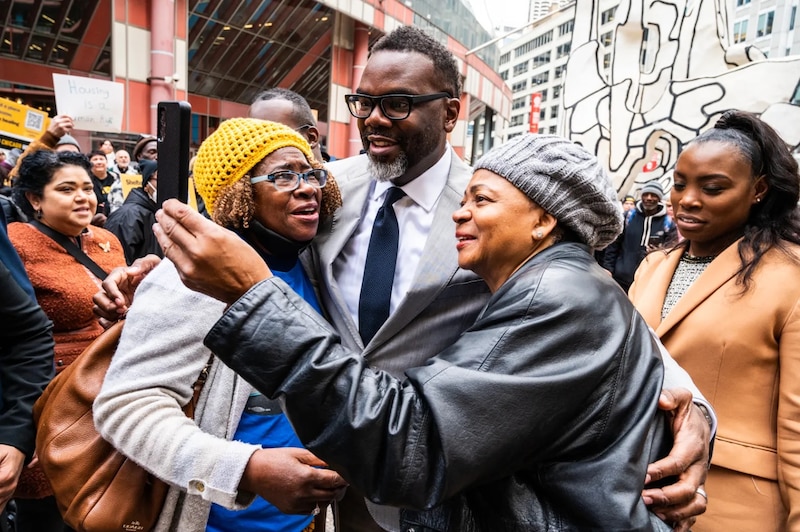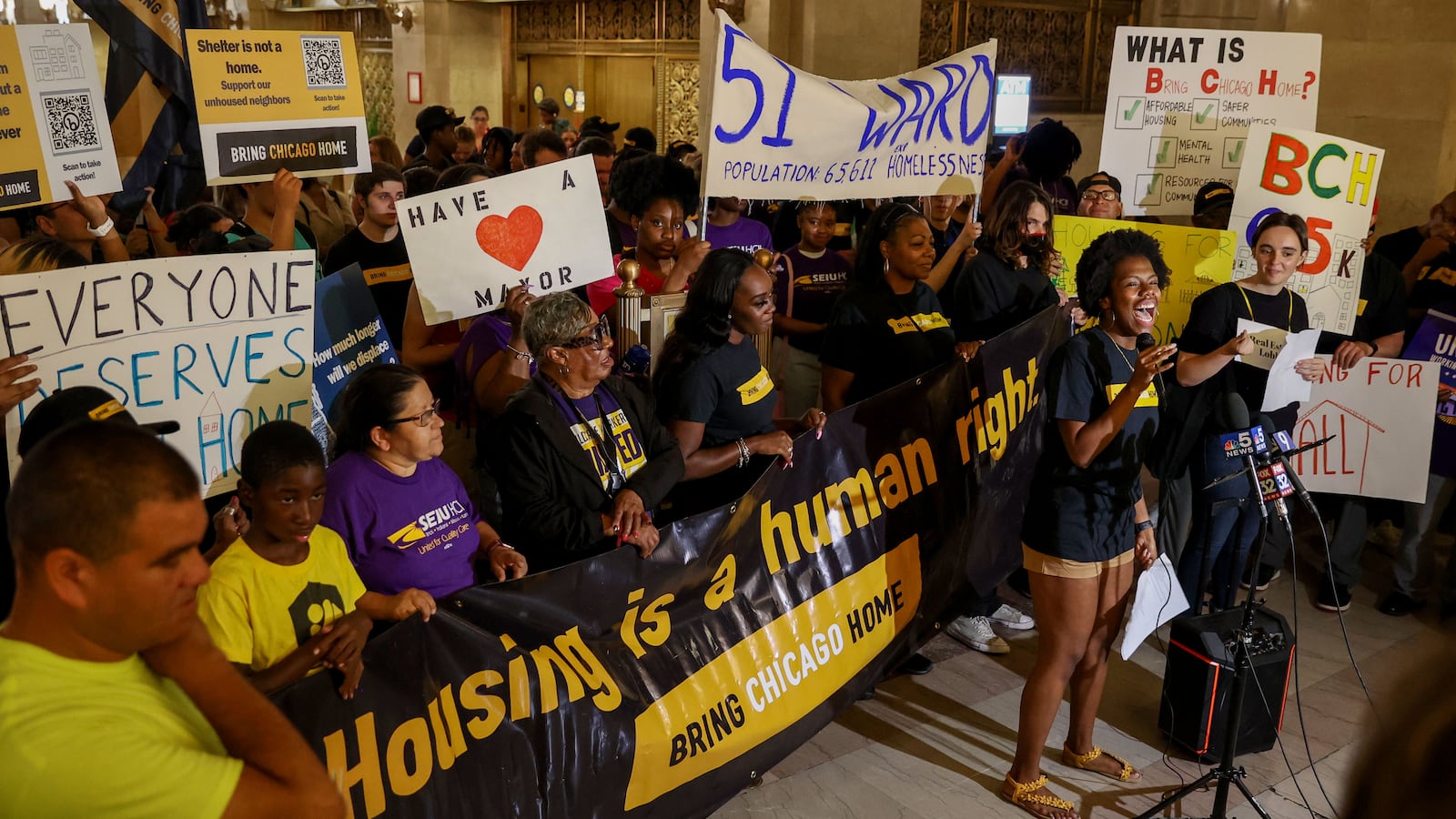Sign up for Chalkbeat Chicago’s free daily newsletter to keep up with the latest education news.
Derrianna Ford lived with her grandmother on Chicago’s north side growing up, but when the older woman lost her home, Ford and her siblings had to relocate to the south side for about a year.
They moved from the city’s West Ridge neighborhood to the South Side during her freshman year at Mather High School. Ford said she had to wake up at 4 a.m., take a bus to the southernmost stop on Chicago’s Red Line, ride almost the entire 26-mile route north, and then get on another bus in order to get to school by 8 a.m.
During the week, she would occasionally stay with a friend closer to school to avoid the long commute.
“This is so normal to us,” Ford said. “You don’t see yourself as struggling because you’re used to it. You don’t see it as homelessness.”
These days, Ford, now 20, is searching for a place of her own. But she has another goal. She’s knocking on doors to help pass a ballot referendum in Chicago on March 19 that advocates say could put a real dent in reducing homelessness.
Chicago Mayor Brandon Johnson, a former teachers union organizer and middle school teacher, promised in his education platform and transition plan to house the city’s homeless, with a focus on more than 20,000 students in Chicago Public Schools currently facing housing instability. In the last year, the number of CPS students in unstable housing situations — which can disrupt or derail students’ academic progress — has risen by roughly 50%.
To address that, Johnson and his allies are pushing to increase a real estate transfer tax on sales of property sales worth more than $1 million to generate an estimated $100 million annually to fund services for the homeless and affordable housing.
Some progressive groups, including the Chicago Teachers Union which helped propel Johnson to office, have been advocating to increase the city’s real estate transfer tax to help the homeless since Rahm Emanuel was mayor. The effort — dubbed Bring Chicago Home — is something Johnson emphasized often on the campaign trail last year.
“The people of Chicago voted for me because I said that I’m going to address homelessness,” Johnson said Wednesday. “Bring Chicago Home is an opportunity to address homelessness.”
A document obtained by Chalkbeat outlining Johnson’s first-term goals suggested his administration hopes to help house 10,000 students and their families.
But opponents of the initiative challenged the ballot question’s legality in the courts, even asking the Illinois Supreme Court to block the measure, which the court declined to do Wednesday. Still, some groups, including the nonpartisan budget watchdog Civic Federation, are concerned the mayor and City Council have not been specific enough about how the money would be used.
“This is the mayor’s signature item,” said Ald. Brendan Reilly, who represents much of downtown and opposes the referendum because it lacks specifics and could have unintended consequences on rental property and commercial real estate. “He’s put a lot of political capital into it and right now the Chicago electorate gets to give him a report card. I think this is as much about the policy as it is about a commentary on his agenda.”
Chicago Public Schools would not directly get any of the estimated $100 million in revenue that a change to the real estate transfer tax would generate. CPS officials did not comment on the ballot initiative, but said the district will continue to support homeless students and protect their rights under federal law.
More Chicago Public Schools students identified as homeless
The number of students in temporary living situations enrolled at Chicago Public Schools has hovered around 5% for at least the last decade — twice the national average. Recent data indicates the problem is getting more acute as the numbers climb.
District data shared with Chalkbeat from the end of February indicated 21,855 students currently enrolled at CPS were considered Students in Temporary Living Situations, or STLS. That’s up from more than 14,317 such students last February. CPS data includes any student categorized this way at any time during the school year, and once a student is marked as such, they keep that status for the remainder of the year.
The vast majority — around 16,000 students — are classified as “doubled up,” meaning they are living with another family temporarily, like Ford was while a freshman in high school.
But the number of CPS students listed as living in a shelter, hotel or motel, or living out of a car, park, or other public place more than tripled in the last year — from about 2,000 last February to nearly 8,000 as of Feb. 29. The jump has coincided with the ongoing influx of migrants arriving from the southern border.
Chicago grappled with students facing homelessness or housing instability long before the COVID pandemic and recent wave of migrants. A 2021 study from the University of Chicago Inclusive Economy Lab analyzed nine years of district data between 2009 and 2018 and found that, over the course of their K-12 experience, about 13% of CPS students experienced housing instability.
The report noted that research shows homeless students come to school less often, have lower academic achievement, and are more likely to drop out. At the same time, school districts like CPS “have limited capacity to connect students to housing supports.”
Cook County Commissioner Tara Stamps, the daughter of a longtime housing activist, saw this “heartbreaking” reality up close during the more than two decades she spent as a classroom teacher, including working alongside Johnson at a school serving the Cabrini Green public housing complex.
One time, she said, a single mom of one of her students had no place to stay, so Stamps and the school’s security guard “called and called and called around” to help them find housing.
Stamps, who now also works for the Chicago Teachers Union, said past administrations have emphasized academic achievement and improving test scores without prioritizing the conditions students faced that affected those scores: “There is no [academic] progress … if a baby doesn’t know where they’re going to sleep at night, if they don’t know where they’re going to eat.”.
Federal law requires school districts to support students facing housing insecurity. Some districts also get money through competitive grants to support homeless students. Students identified as such are entitled to transportation, the right to enroll without a permanent address, and the right to continue attending the same school through the end of the academic year even if they move.
But few districts have been directly involved in finding families housing.
With the help of federal COVID money, some schools across the country have added staff to help families with housing, others have provided emergency hotel stays and even propped up shelters inside schools.
Alyssa Phillips, an education attorney with the Chicago Coalition for the Homeless, which has been advocating for Bring Chicago Home for several years, said the city needs a consistent revenue stream to tackle homelessness, along with input about what works from people experiencing homelessness and service providers.
“I think the most important thing is having that continuous funding,” Phillips said.
Federal COVID money for homeless set to expire
During the COVID pandemic, housing instability rose across the country. Homeless students were disconnected from schools and districts struggled to identify how many students were entitled to additional support and resources.
Chicago Public Schools received about $10.1 million in federal pandemic aid to serve homeless students, as part of roughly $800 million distributed nationally to states and school districts.
The city and school district created a program to give $500 stipends to families in Students in Temporary Living Situations, using money from the initial 2020 wave of federal COVID relief dollars. It’s not clear how many families received the money, and district officials deferred to the city, which administered the program.
Ald. Maria Hadden, who represents Chicago’s north lakefront and is a supporter of the Bring Chicago Home initiative, said the city also used some of its share of federal COVID dollars to provide rental assistance to thousands of people. She recounted helping one family in her ward with a CPS student with epilepsy avoid an eviction because they were able to get six months of rental assistance.
But soon, federal COVID money is drying up. Expenditure data obtained by Chalkbeat shows most of the school district’s share of federal COVID money has been spent, primarily for school staff.
If the ballot initiative to raise the real estate transfer tax on property over a $1 million is approved, Hadden said, the city could revive, continue, or expand pandemic-era programs, like rental and mortgage assistance and rapid rehousing efforts for people living in tent encampments.

Political ‘slush fund’ or nimble revenue stream?
Ford and others continue to knock on doors to garner support from voters who will ultimately decide whether Chicago should have a graduated real estate transfer tax.
Meanwhile, the Chicago Teachers Union is gearing up for another round of contract negotiations with a mayor more amenable to their views than his two predecessors. During contract negotiations in 2019, the union pushed to include provisions around affordable housing. But then-Mayor Lori Lightfoot said the union contract was “not the appropriate place for the City to legislate its affordable housing policy.”
Leaked contract proposals for upcoming contract talks include two focused on affordable housing: mortgage and rental assistance for teachers, and a vocational program that would have students build affordable housing.
Whatever happens with the teachers union contract, Johnson is forging ahead with a plan to borrow $1.25 billion dollars to fund affordable housing and other development. On Wednesday, the mayor said he’ll soon name a new chief homelessness officer. And he directed the city’s Department of Family Support Services to work with CPS to match the district’s most vulnerable students with housing. The two agencies meet weekly, a spokesperson confirmed.
If voters approve the ballot initiative, the City Council would still need to pass an ordinance spelling out how to appropriate the revenue.
Reilly, the downtown alderman, said that “anyone who has a soul” cares about the homeless and wants to find solutions. But he worries that if the tax is approved, the revenue could quickly turn into a “slush fund” for political allies of whomever is mayor.
“There’s no guarantee that any of this money lands with helping the homeless people,” Reilly said. “It’s just going to be a big stack of money that a whole lot of people are gonna wanna fight over.”
Emma Tai, campaign director for the Bring Chicago Home Ballot Initiative, said the revenue would be legally dedicated to fund affordable housing and services for the homeless. A draft ordinance for implementing the change to the transfer tax would create a 15-member panel appointed by the mayor and approved by City Council to make recommendations annually based on the “most pressing needs.”
“The idea is for the funds to be nimble,” Tai said, noting that during the height of the pandemic, there was a critical need to provide housing to domestic violence victims, whereas now that pandemic-era eviction moratoriums have ended, there’s a need for emergency rental assistance. The idea is that the panel’s recommendations would take such shifts into account.
For young people like Derrianna Ford, who experienced housing insecurity as a student and is searching for an affordable apartment now, the issue boils down to one thing: “stability.”
This story has been updated to more accurately characterize Tai’s comments about how housing needs have shifted in Chicago.
Chalkbeat reporter Reema Amin contributed reporting.
Becky Vevea is the bureau chief for Chalkbeat Chicago. Contact Becky at bvevea@chalkbeat.org.
